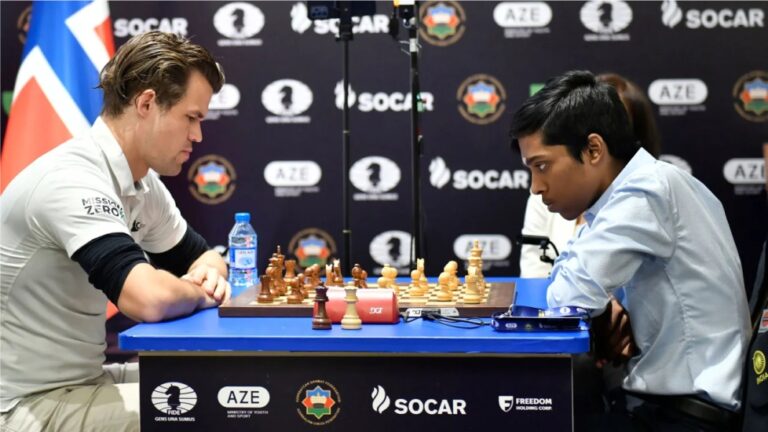![]()
In a riveting display of skill and determination, R Praggnanandhaa, a prodigious 18-year-old chess phenom, recently took the global chess stage by storm during the Chess World Cup final. While he ultimately conceded victory to the reigning champion Magnus Carlsen, Praggnanandhaa’s performance underscored a promising future awaiting him in the world of chess.
The journey towards the final showcased not only his raw talent but also his unwavering resolve. Under the guidance of his coach, RB Ramesh, Praggnanandhaa embodied the rise of young talents in the chess world, a fact Ramesh acknowledged just before the FIDE World Cup began.
In an unprecedented turn of events, the quarterfinals witnessed four Indian youngsters, including Praggnanandhaa, making their mark. Praggnanandhaa’s ascent was particularly stunning, as he overcame challenges posed by eminent players like Hikaru Nakamura, Arjun Erigaisi, and Fabiano Caruana, the World No. 2 and World No. 3, respectively. His remarkable achievement of becoming the youngest World Cup finalist ever was sealed with grit and finesse, defying his seeding as the 31st contender.
However, Praggnanandhaa’s journey is more than a tale of triumphs. It is a testament to the flourishing of Indian chess, a transformation catalyzed by the surge in interest during the pandemic. Praggnanandhaa’s pivotal moment came when he defeated the five-time world champion Magnus Carlsen at the age of 16, etching his name as the youngest player to achieve this feat. Commendations poured in from luminaries like Prime Minister Narendra Modi and cricket icon Sachin Tendulkar.
Raised in the shadow of his sister Vaishali Rameshbabu, a local chess champion, Praggnanandhaa embarked on his chess journey at the tender age of three. His extraordinary aptitude for the game quickly propelled him to prominence. Notably, he secured the title of the world’s youngest International Master at the age of 10 years and 10 months by clinching victory in the World Youth Chess Championship’s under-14 category. By 12, he earned the esteemed title of Grandmaster, becoming the second-youngest in history. Even more astonishingly, Praggnanandhaa set a world record by attaining a 2600 ELO rating at just 14 years old.
Though attention has recently gravitated towards D Gukesh, a 17-year-old chess prodigy who ascended to the highest-rated Indian player position, Praggnanandhaa’s progress hasn’t stagnated. His coach, Ramesh, clarified that Praggnanandhaa’s apparent slowdown in terms of ratings was a consequence of the pandemic-induced hiatus. Despite fewer FIDE-rated tournaments, he gained invaluable experience from engaging with top-tier players in online rapid events.
The Meltwater Champions Tour in 2021 spotlighted Praggnanandhaa’s prowess as he secured victories over distinguished names like Sergey Karjakin, Teimour Radjabov, and Jan-Krzystof Duda, along with draws against Carlsen. His consecutive victories over Carlsen in online rapid format further solidified his stature.
Securing a spot in the World Cup final marked an impressive milestone for Praggnanandhaa, making him the first Indian since Viswanathan Anand in 2002 to achieve this distinction. Nonetheless, his ultimate aspiration undoubtedly centers around the World Chess Championship. His participation in the upcoming Candidates Tournament has positioned him to vie for this coveted title.
Magnus Carlsen’s acknowledgment of Praggnanandhaa’s exceptional performance and his prediction that the new generation, including Praggnanandhaa and Gukesh, will soon dominate the chess realm further cements their potential. As the chess world witnesses the rise of these young prodigies, the future of the sport appears to be in capable hands.
In conclusion, R Praggnanandhaa’s journey from a chess enthusiast at three years old to a promising contender on the global stage showcases his remarkable talent, unwavering dedication, and the resurgence of Indian chess. As he continues to pursue his dreams, he exemplifies the dawn of a new era in chess, where youth and skill converge to shape the future of the sport.
Reference:







